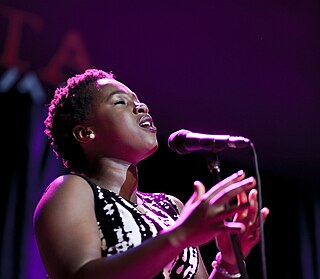
Cape Verde is known internationally for morna, a form of folk music usually sung in the Cape Verdean Creole, accompanied by clarinet, violin, guitar and cavaquinho. Funaná, Coladeira, Batuque and Cabo love are other musical forms.

The morna is a music and dance genre from Cape Verde. It was proclaimed Intangible Cultural Heritage of Humanity by UNESCO on December 11, 2019.
The coladeira is a music genre from the Cape Verde islands in the central Atlantic Ocean.

The culture of Cape Verde is rich, with a range of customs and practices common in the islands.
Maria de Barros is a singer most associated with Cape Verde, the land of her parents. Growing up in Nouakchott, Mauritania, she moved to the United States at the age of 11, living in Providence, Rhode Island in her youth with her four siblings, and connecting more closely with her heritage in the local Cape Verdean community. She is married to, Mel Wilson Jr., a bassist with Toots and the Maytals.

Cesária ÉvoraGCIH was a Cape Verdean singer known for singing morna, a genre of music from Cape Verde, in her native Cape Verdean Creole. Her songs were often devoted to themes of love, homesickness, nostalgia, and the history of the Cape Verdean people. She was known for performing barefoot and for her habit of smoking and drinking on stage during intermissions. Évora's music has received many accolades, including a Grammy Award in 2004, and it has influenced many Cape Verde diaspora musicians as well as American pop singer Madonna. Évora is also known as Cizé, the Barefoot Diva, and the Queen of Morna.
Adriano Gonçalves, known by his stage name Bana and called the "King of Morna", was a Cape Verdean singer and performer of the morna style, the plaintive, melodic lament which is a staple musical style of the country.

Fantcha is a Cape Verdean singer.
Ana Firmino is a Cape Verdean singer. She was born in 1953 on the island of Sal, but it was not until she was in her late 20s that she dedicated herself to a career in music. She has performed for many years in Cape Verde and Europe particularly in Portugal, appearing in film and on television releasing several solo albums including Amor e Tao Sabe (1998). She is a well-regarded interpreter of the native morna as well as other traditional genres. One of her signature songs is Chico Malandro, produced by one of Cape Verde's most successful musicians Tito Paris.

Kontinuasom is a 2010 documentary film which was released in Cape Verde and Spain. It was directed by Oscar Martinez. The film describes the musical heritage and culture of Cape Verde.
Maria Alice may also refer to a Portuguese fadista

Cape Verdeans, also called Cabo Verdeans, are a people native to Cape Verde, an island nation in West Africa consisting of an archipelago in the central Atlantic Ocean. Cape Verde is a multi-ethnic society, which means that it is home to people of many different ethnic backgrounds. Cabo Verdeans do not consider their nationality as an ethnicity but as a citizenship with various ethnicities.

Karin Mensah is a classically trained singer from Cape Verde, whose preferred genre is jazz and traditional music from West Africa. She is a music educator who has served as the founder and director of the Accademia Superiore di Canto in Verona, Italy, since 2004.
"Sodade" is a Cape Verdean song written in the 1950s by Armando Zeferino Soares, and best popularized by Cesária Évora on her 1992 album Miss Perfumado. The name is the Cape Verdean Creole variant of the Portuguese term saudade.

Epifânia de Freitas Silva Ramos Évora, better known as Dona Tututa or Tututa Évora was a Cape Verdean composer and a pianist.

Nancy Vieira is a Cape Verdean singer. She was born in Guinea-Bissau and currently resides in Portugal.
Gardénia Benrós is a Cape Verdean singer.

Elida Almeida is a Cape Verdean singer.
The Cape Verde Music Awards is an annual music award ceremony that takes place every year. The award ceremony takes place in the capital city of Praia, Cape Verde. It is also broadcast on TCV.

Criolinha is an album by the Cape Verdean musician Fantcha. It was released in the United States in 1998. The album is primarily a collection of coladeira songs, although it includes a few mornas. Fantcha supported the album with a North American tour.










